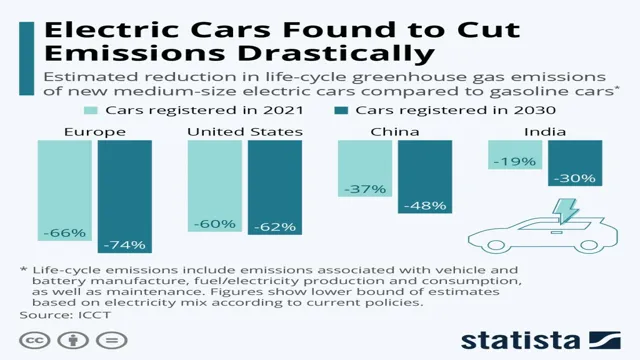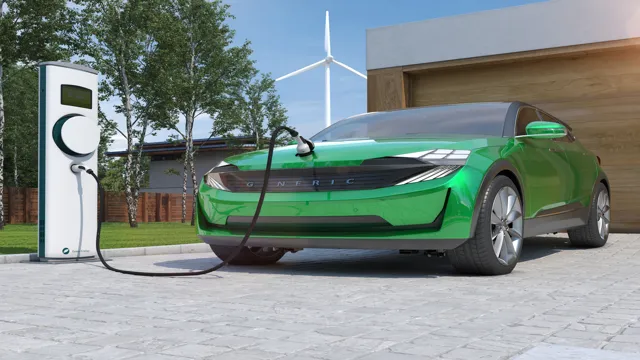Driven Towards Sustainability: The Environmental Benefits of Electric Cars Over Combustion Engines
Electric cars have been around for a while now and have certainly risen in popularity over the years. With fossil-fueled vehicles contributing to the majority of global air pollution, it’s exciting to see an eco-friendly movement driving this market. The increasing demand for clean energy is making electric cars more affordable and accessible to the masses.
But, what are the environmental benefits of electric cars? How do they compare to traditional gas-powered vehicles? In this blog post, we’ll explore the ways in which electric cars can positively impact the environment and why you should consider making the switch.
Lower Emissions
One of the most significant environmental benefits of electric cars over combustion engine cars is the lower levels of emissions they produce. Electric cars do not emit any tailpipe emissions, which means they do not release pollutants such as carbon dioxide, carbon monoxide, and nitrogen oxides into the atmosphere that can contribute to climate change and harmful air quality. In contrast, combustion engine cars emit a significant amount of these pollutants, and their emissions are responsible for contributing to greenhouse gas emissions.
By opting for electric cars, individuals can significantly reduce their carbon footprint and contribute to a healthier and cleaner environment for all.
Electric cars produce fewer greenhouse gases compared to combustion engines.
When it comes to reducing our carbon footprint, electric cars can play a vital role. These vehicles are powered by electricity instead of gasoline and are known to produce fewer greenhouse gases compared to combustion engines, making them an excellent option for eco-conscious drivers. Electric cars offer zero emissions at the tailpipe, meaning they don’t emit any pollutants into the surrounding environment, unlike their traditional counterparts.
The primary reason for this is that electric cars run on lithium-ion batteries, which are charged from an external source like solar or wind power. Furthermore, they produce significantly less pollution during their manufacturing process as there is no need for the production of fuel-intensive components like fuel pumps, oil filters, or exhaust systems. Although the electricity grid still produces emissions, electric cars are still considerably less polluting compared to conventional cars.
Therefore, electric cars are a promising way to reduce emissions and help fight climate change.
Electricity generated from renewable energy can make electric cars completely emission-free.
Electric cars have been gaining popularity in recent years, and for good reason. They offer a cleaner, more sustainable way to travel without the harmful emissions produced by traditional vehicles. However, the amount of emissions from an electric car largely depends on how the electricity used to power it is generated.
That’s where renewable energy comes in. Electricity generated from renewable sources, such as solar or wind power, can make electric cars completely emission-free. By using clean and sustainable energy, we can reduce our carbon footprint and help create a healthier environment for ourselves and future generations.
So, next time you think about buying an electric car, consider powering it with renewable energy to significantly lower your emissions and make a positive impact on the planet.
Less Air and Noise Pollution
One of the most significant environmental benefits of electric cars over combustion engine ones is the reduction in air and noise pollution. As electric cars run on battery-powered electric motors, they produce no tailpipe emissions, such as carbon dioxide, carbon monoxide, and nitrogen oxides. On the other hand, traditional gasoline-powered vehicles emit these harmful gases that contribute to air pollution, which can have adverse effects on public health, particularly in urban areas.
Additionally, electric cars are typically quieter than combustion engine ones, making them ideal for densely populated cities where noise pollution can be a serious concern. By switching from traditional gasoline cars to electric ones, we can significantly reduce our impact on the environment and improve the quality of life for people living in those areas. Ultimately, driving an electric car can help to create a cleaner and more sustainable future for generations to come.
Electric cars produce no tailpipe emissions, improving air quality in cities.
One of the most significant advantages of electric cars is their ability to reduce air and noise pollution in cities. Traditional vehicles that rely on gas and diesel engines emit harmful pollutants into the air that contribute to poor air quality and health issues. In contrast, electric cars produce no tailpipe emissions, which dramatically reduces air pollution levels.
Cleaner air improves the overall health and well-being of city dwellers, especially those who are vulnerable to respiratory problems. Additionally, electric cars operate quietly, eliminating the noise pollution associated with traditional vehicles’ engines. Cleaner air and reduced noise pollution contribute to more pleasant urban environments, making electric cars an excellent choice for environmentally-conscious drivers.
Electric cars are quieter than combustion engine cars, reducing noise pollution.
Electric cars are becoming increasingly popular due to their numerous benefits, including reducing air and noise pollution. Combustion engine cars release harmful emissions, contributing to air pollution that affects our respiratory system. On the other hand, electric cars produce zero emissions from their tailpipes, hence no particulate matter pollutes the air.
Additionally, electric cars are quieter than combustion engine cars, reducing noise pollution, and creating a more peaceful environment. This not only benefits individuals living in crowded areas but also wildlife that needs quiet surroundings for survival. It’s fascinating to imagine living in a world where cars are eerily silent, reducing the noise levels on our streets.
It’s like listening to a symphony performed by an orchestra in complete harmony, where each instrument contributes its unique sound. Electric cars, like these instruments, create a harmonious blend that benefits everyone. By choosing electric cars over combustion engine cars, we’re taking steps towards reducing air and noise pollution, improving our health, and creating a better environment for future generations.
In conclusion, electric cars are indeed quieter than combustion engine cars, making them a better option for urban and suburban areas alike. As these vehicles grow in popularity, we’ll experience a decrease in noise pollution and air pollution, benefitting our health and the environment. By choosing electric cars over combustion engine cars, we’re playing our part in building a cleaner and quieter world.
Reduced Resource Use
Electric cars offer significant environmental benefits compared to combustion engine cars, particularly when it comes to reducing resource use. Electric cars consume less energy and are more energy-efficient than combustion engine cars. This is because electric cars use rechargeable batteries that run on electrical power, which is cleaner and more sustainable compared to gasoline or diesel.
In addition, electric cars do not produce harmful emissions, which significantly reduces air pollution and protects the environment. The reduced resource use of electric cars means that less fossil fuel is needed for energy production, which further reduces greenhouse gas emissions. So, if you’re looking to reduce your carbon footprint and contribute to a healthier planet, switching to an electric car can make a significant difference.
Electric cars use fewer natural resources, such as oil and metals, than combustion engines.
Electric cars have revolutionized transportation by cutting down on the use of natural resources, such as oil and metals. Oil is a non-renewable resource that is depleting quickly, while burning it in combustion engines releases harmful pollutants into the environment. On the other hand, electric cars rely on batteries that can be charged with electricity from renewable sources like wind or solar power.
Additionally, the production of electric cars requires significantly fewer metals like steel and copper than traditional combustion engines, reducing the strain on earth’s natural resources. This means that electric cars not only have a lower carbon footprint but also reduce the demand for finite resources. The shift towards electric cars is crucial in our efforts to promote sustainable living and reduce the impact of climate change.
As we continue to adopt electric cars as our primary mode of transportation, we can ensure that we are doing our part to preserve our planet for generations to come.
Electric cars also produce less waste from oil changes and other maintenance requirements.
When it comes to maintaining an electric car, the process is much simpler and less wasteful than that of a traditional gasoline-powered vehicle. This is because electric cars do not require oil changes or other regular maintenance that internal combustion engines need. Instead, electric cars primarily require tire rotations, brake pad replacements, and occasionally topping up the coolant and brake fluids.
This simplicity means that less waste is produced, and fewer resources are needed to make and dispose of necessary car maintenance products. Not only is this better for the environment, but it also saves car owners time and money in the long run. So, if you’re considering purchasing an electric car, you can feel good knowing that you’re making a more sustainable and low-waste choice.
Conclusion
At the end of the day, it’s clear that electric cars have a significantly lower environmental impact compared to their combustion engine counterparts. From reducing harmful emissions to increasing energy efficiency, electric cars are paving the way for a greener and more sustainable future. So next time you’re looking to upgrade your ride, consider going electric – not only will you be doing your part for the environment, but you’ll also be the envy of all your combustion engine driving friends.
Go green or go home!”
FAQs
What are the environmental benefits of electric cars compared to combustion engine cars?
Electric cars emit significantly less greenhouse gases and air pollutants than combustion engine cars, resulting in improved air quality and reduced carbon emissions.
Is it more cost-effective to own an electric car in the long run?
Yes, electric cars have lower operating and maintenance costs compared to combustion engine cars due to lower fuel costs, fewer moving parts, and longer lifespans.
How does the production of electric cars affect the environment?
The production of electric cars requires fewer resources and emits fewer pollutants than the production of combustion engine cars, resulting in a smaller carbon footprint.
What is the range of electric cars compared to combustion engine cars?
Range varies between electric car models, but some have comparable or even longer ranges than some combustion engine cars. Additionally, advancements in battery technology are expected to further improve electric car ranges in the near future.




